NMPF Advocates for U.S. Dairy Priorities in Upcoming NAFTA Talks
July 06, 2017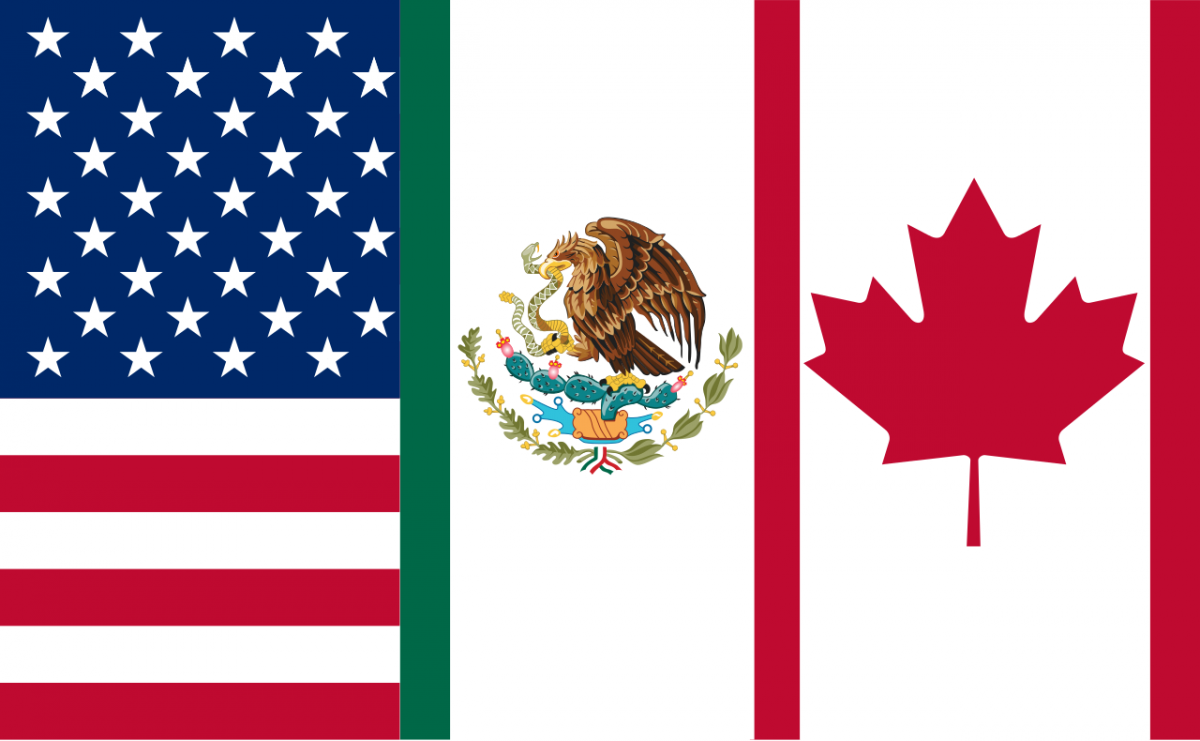 As the United States, Mexico and Canada move closer to talks on re-negotiating the North American Free Trade Agreement (NAFTA), NMPF is emphasizing the importance of strengthening our trade relationship with Mexico and addressing Canada’s habitual anti-free trade policies in dairy.
As the United States, Mexico and Canada move closer to talks on re-negotiating the North American Free Trade Agreement (NAFTA), NMPF is emphasizing the importance of strengthening our trade relationship with Mexico and addressing Canada’s habitual anti-free trade policies in dairy.
The Trump Administration formally launched the NAFTA modernization process in May when it notified Congress of plans to proceed with renegotiating the 24-year-old trade pact. Through joint comments, hearings and high-level meetings, NMPF has delivered a strong and clear message: U.S., negotiators must preserve the successful relationship of open and dependable dairy trade with Mexico that has been established through NAFTA while addressing Canada’s protectionist dairy policies, including that nation’s harmful new pricing schemes.
On June 12, NMPF and the U.S. Dairy Export Council pledged to work with the Trump Administration throughout the modernization process to achieve these goals. In joint comments to the U.S. Trade Representative, the groups described the existing North American dairy landscape as one in which U.S. dairy products flow relatively unhindered to Mexico, but are curtailed by Canada’s exorbitant tariffs and increased use of policy tools hampering free trade and violating international trade obligations.
“The relationship between the dairy sectors of the United States, Mexico and Canada is of such great importance to all of our nations that we need to devote the time and effort to make it better,” said Jim Mulhern, president and CEO of NMPF. “A modernized NAFTA agreement must preserve the strategically valuable trade relationship with Mexico, and remove remaining barriers to trade with Canada that were not adequately addressed in the original agreement.”
These same priorities were emphasized in a resolution approved unanimously by the NMPF Board of Directors at its June 14 meeting in Washington, D.C.
NMPF reminded the Trump Administration last month that a modernized NAFTA has the potential to increase U.S. dairy exports, create jobs and build business partnerships between the three countries. On the other hand, withdrawing from NAFTA could devastate the U.S. dairy industry. Last year’s dairy exports to Mexico – America’s top dairy export market – equaled the milk output of 1,500 American dairy farms.
One of NMPF’s top requests of the Trump Administration is for a “decisive confrontation and resolution” of nontariff concerns, including the removal of Canadian milk pricing classes 6 and 7. This is a point NMPF hammered home during recent months, including most recently when National Milk was joined by an international coalition of nine other dairy organizations from the United States, Argentina, Australia, New Zealand, Mexico and the European Union in a coordinated effort to ask that their respective trade ministers confront Canada’s policy.
NMPF’s main concern in NAFTA for Mexico is ensuring that this critically important trade relationship is not in any way disrupted. This includes prioritizing new rules for a sanitary and phytosanitary chapter, and taking further steps in NAFTA to protect the ability of U.S. companies to sell cheeses with common names, like "parmesan" and "asiago.” An aggressive ongoing effort by the European Union (EU) to claim sole ownership of these cheeses must be rejected by Mexican and U.S. officials, NMPF told trade officials last month.
NMPF has also been deeply involved in shaping the NAFTA dairy negotiation strategy through engagement with administration staff, through both private, high-level meetings and at public hearings. Shawna Morris, NMPF’s vice president for trade policy, spoke before the International Trade Commission’s hearing on NAFTA tariff issues on June 20, while Jaime Castaneda, NMPF’s senior vice president for trade policy and strategic initiatives, testified at a USTR hearing on NAFTA modernization on June 27. Mulhern has been actively engaged in the administration’s Agricultural Policy Advisory Committee for Trade, which provides input on the NAFTA negotiations to USDA Secretary Sonny Perdue and U.S. Trade Representative Robert Lighthizer.
Since NAFTA’s implementation, the United States has shifted from being a consistent net importer of dairy products to being a significant net exporter. Over the past five years, cumulative U.S. dairy exports are more than double the import total. Last year alone, the U.S. dairy industry exported $1.2 billion worth of dairy products to Mexico. Mexico is the largest U.S. dairy export market by far, roughly double the size of the industry’s second-largest market, Canada.
NMPF Members Meet with Lawmakers During June Capitol Hill Fly-in
July 06, 2017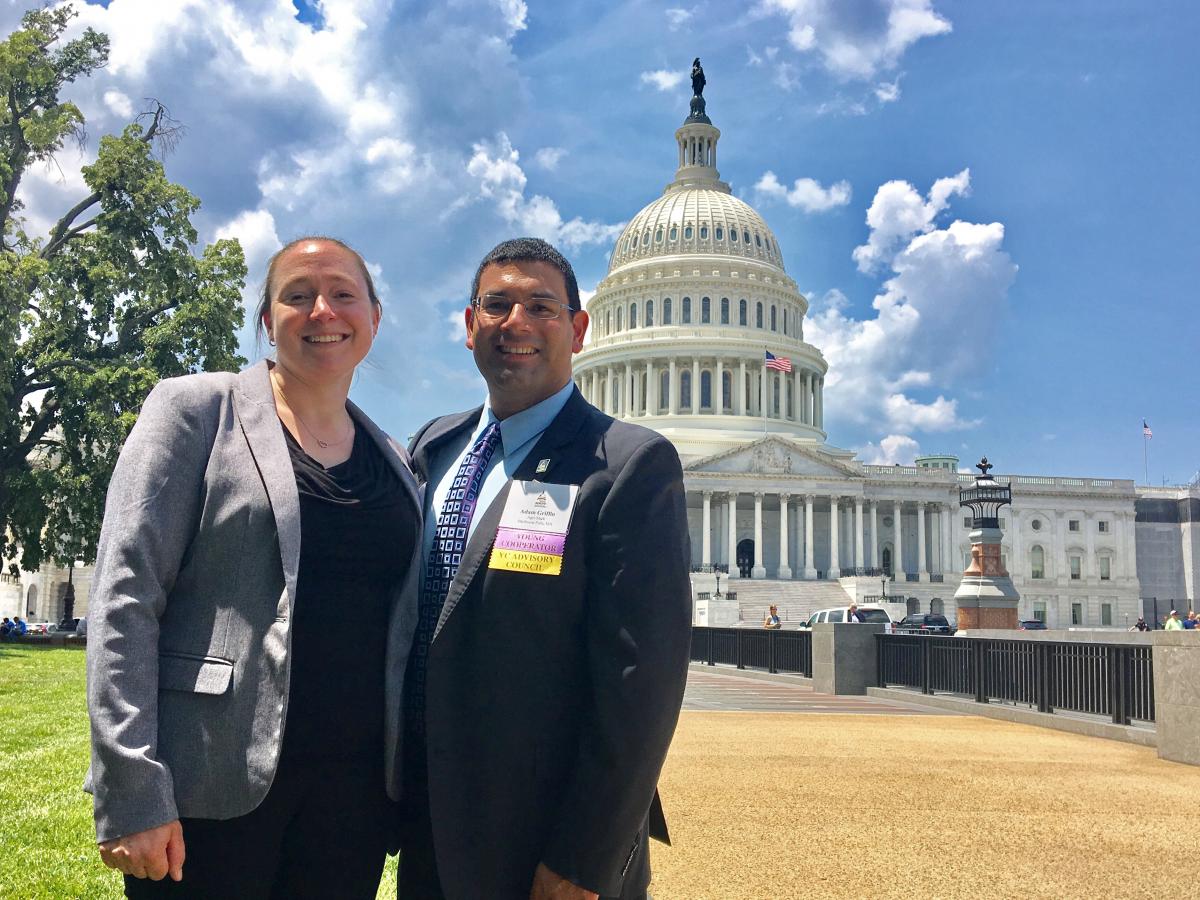 More than 60 dairy farmers from across the country descended upon Washington, D.C., in mid-June as part of NMPF’s annual young farmer fly-in, where in more than 200 meetings they asked their elected officials for support on key issues of importance to the dairy farmer community, including trade, food labeling, labor availability and the farm bill.
More than 60 dairy farmers from across the country descended upon Washington, D.C., in mid-June as part of NMPF’s annual young farmer fly-in, where in more than 200 meetings they asked their elected officials for support on key issues of importance to the dairy farmer community, including trade, food labeling, labor availability and the farm bill.
Farmers from 21 states visited their House and Senate members on June 13 as part of their participation in the 2017 NMPF Young Cooperator (YC) program. During these meetings, dairy producers discussed the challenges they currently face, and highlighted four priority policy issues they hope Congress will act on in the near future: the need to make significant improvements to the dairy Margin Protection Program; passage of the DAIRY PRIDE Act, which would require the U.S. Food and Drug Administration to enforce existing food standards for milk; a pro-active approach to trade policy, especially as the 24-year-old NAFTA agreement is renegotiated; and immigration reform that will protect the current agricultural workforce and provide the availability of farm labor in the future.
 “We are excited to share the first-person perspective of America’s dairy sector at a time when elected officials in Washington really need to hear our voices about the topics that matter most to farmers,” said Melissa Griffin, a dairy farmer from Buckland, Mass., and chairwoman of the 2017 YC Advisory Council.
“We are excited to share the first-person perspective of America’s dairy sector at a time when elected officials in Washington really need to hear our voices about the topics that matter most to farmers,” said Melissa Griffin, a dairy farmer from Buckland, Mass., and chairwoman of the 2017 YC Advisory Council.
After an initial planning meeting on June 12, the YCs attended an educational seminar on how to properly speak with Congress members and their staff. The day after the Hill visits, they participated in NMPF’s board meeting, where they learned about the many other endeavors National Milk is currently undertaking on their behalf.
Agreement Increases Access to China, U.S. Dairy’s Third-Largest Export Market
July 06, 2017After more than two years of extensive effort by NMPF and the U.S. Dairy Export Council (USDEC), the United States and China signed a Memorandum of Understanding (MOU) last month that will increase access to China for more than 200 U.S. dairy exporters in the short-term, and paves the way for additional U.S. entrants to the Chinese market in the future.
The MOU creates new, sizeable opportunities for dairy farmers and processors, as well as the milk, cheese, infant formula and ingredients they produce. "This is a great example of successful teamwork, both between NMPF and USDEC, as well as between our two dairy organizations and the U.S. government,” said NMPF President and CEO Jim Mulhern. “The opportunity to increase our sales to China will improve the economic situation for U.S. dairy farmers and support tens of thousands of jobs in the industry that extend beyond the farm.”
USDEC and NMPF worked closely with the U.S. Food and Drug Administration (FDA), the U.S. Department of Agriculture (USDA), and the Certification and Accreditation Administration of the People's Republic of China (CNCA), to implement a workable registration process that allows for trade to continue and expand in the future. The MOU also outlines a process in which third-party certification organizations, on FDA's behalf, will audit U.S. dairy facilities to make sure they comply with Chinese food safety requirements. This will provide consistent regulatory compliance between the two countries, each with their own respective, rigid systems.
The journey to formulate the MOU involved more than 20 face-to-face meetings with CNCA, along with extensive interaction with FDA and USDA's Foreign Agricultural Service and Agricultural Marketing Service. In addition, USDEC’s market access team and NMPF’s trade policy staff coordinated two audits of U.S. facilities by Chinese inspectors. Those audits demonstrated the strength and effectiveness of U.S. production standards and FDA regulatory oversight.
The United States shipped $384 million worth of dairy products to China in 2016, making it the industry's No. 3 single-country export market, behind Mexico and Canada. With Chinese demand for imported milk and other dairy products increasing, the potential for job-creating U.S. exports has been high. But market access has been a challenge since China implemented Decree 145 in May 2014, which mandated that a nation must register and certify dairy facilities that want to ship to China and meet Chinese food safety standards.
European Court Decision Helps Bolster NMPF Stance on Enforcement of Dairy Food Labeling Standards
July 06, 2017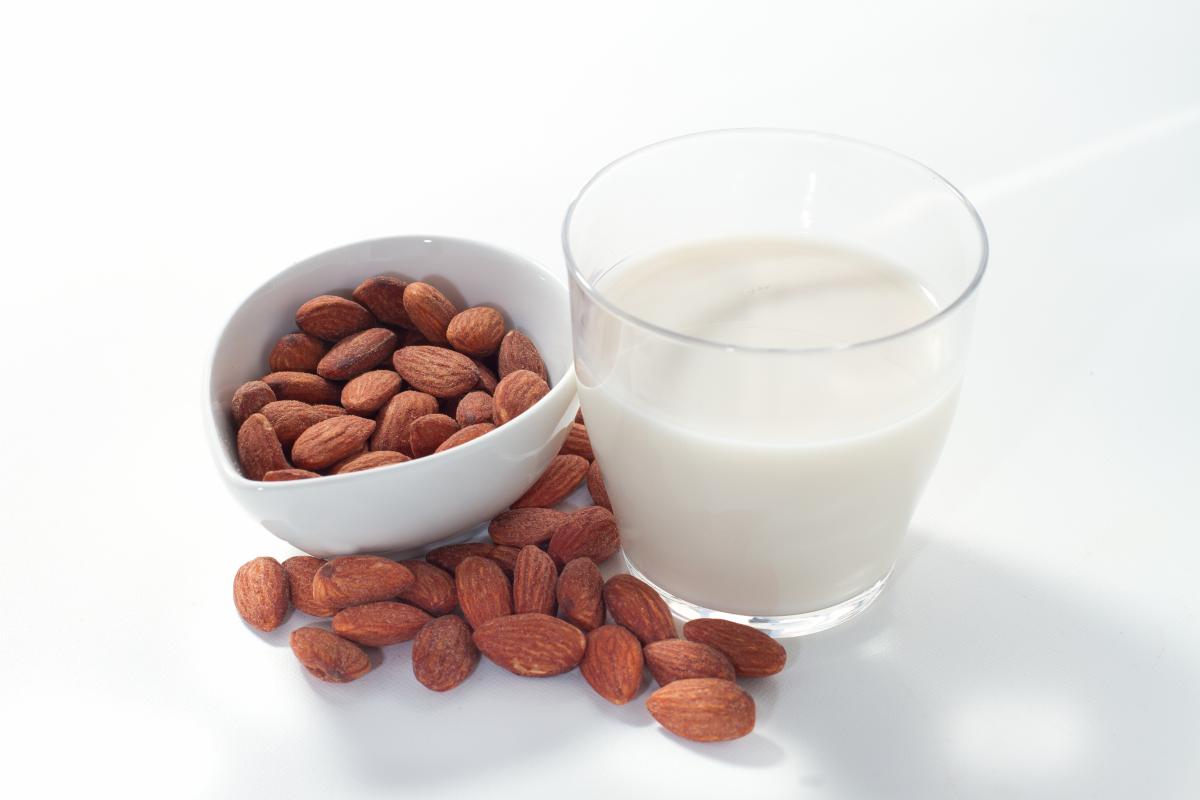 In a decision with clear implications for the regulation of U.S. dairy foods, the European Union (EU) Court of Justice ruled in late June that plant-based food companies cannot use most dairy-specific terms in labeling or advertising, and must abide by European law reserving terms such as “milk” and “cheese” for products derived from animals. During visits with European dairy companies in late June, NMPF’s leadership praised the ruling and discussed ways that dairy farm groups can further collaborate to defend the image and proper marketing of milk products.
In a decision with clear implications for the regulation of U.S. dairy foods, the European Union (EU) Court of Justice ruled in late June that plant-based food companies cannot use most dairy-specific terms in labeling or advertising, and must abide by European law reserving terms such as “milk” and “cheese” for products derived from animals. During visits with European dairy companies in late June, NMPF’s leadership praised the ruling and discussed ways that dairy farm groups can further collaborate to defend the image and proper marketing of milk products.
“The European Court of Justice did just what we’re asking the U.S. Food and Drug Administration (FDA) to do: Uphold and enforce current standards of labeling for milk and milk products,” said Jim Mulhern, NMPF president and CEO. “None of the fake dairy products provides the same high-quality nutrition package as real milk. It is past time that manufacturers of these products, which are factory-made concoctions of powdered plant ingredients and water, abide by existing standards, whether in Europe or the United States.”
The European court decision adds further impetus to NMPF’s campaign this year to encourage passage of the DAIRY PRIDE Act. The legislation would require the U.S. Food and Drug Administration (FDA) to enforce the long-standing regulation that milk must come from an animal source, thus prohibiting plant-based “milks” from using dairy terminology on their labels. NMPF has continued to build support for the House and Senate companion bills since their introductions in late January.
Numerous op-ed pieces have appeared in newspapers around the country in support of the DAIRY PRIDE Act. On June 27, Lancaster Farming published an op-ed by Pennsylvania dairy farmer Lisa Graybeal, who argued that without FDA enforcement, plant-based companies can “skirt the law and freely promote their nutritionally inconsistent — and often inferior — imitations by using imagery and terms associated with real milk’s positive reputation.”
“Doing this creates inaccuracy in your grocer’s dairy case, and it’s unfair to consumers,” she said.
NMPF continues to publish legislative action alerts, news articles, infographics and other materials that advocate support for DPA. NMPF strongly encourages cooperatives to share these materials with staff, producer-members and on social media to garner additional congressional support for the DPA measure.
NCIMS Tetracycline Testing Pilot Program Launches July 1
July 06, 2017As part of ongoing efforts to demonstrate to consumers the safety of the U.S. milk supply, starting this month dairy regulators will begin testing bulk milk tank trucks for the tetracycline family of drugs as part of the NCIMS Pilot Program. These new tests will be conducted alongside the existing beta-lactam drug screening program that is required by the Pasteurized Milk Ordinance (PMO).
NMPF has been engaged in both developing the tetracycline screening protocol and educating the producer community about it since the new program was first outlined at the 2015 National Conference of Interstate Milk Shipments (NCIMS).
As is the case with testing for beta-lactam antibiotics, if any milk tanker is found with a tetracycline drug residue, it will be rejected and its milk dumped. The tolerance level for tetracyclines – set by the U.S. Food and Drug Administration – is 300 parts per billion.
“Over the last 20 years, the percentage of farm milk samples testing positive for the presence of beta lactam antibiotics – the type of antibiotics most commonly used to treat sick cows – has continued to decline from an exceedingly low level of positives to virtually non-existent,” said Beth Briczinski, NMPF vice president of dairy foods and nutrition. “In 1996, 99.9% of samples tested free of antibiotics. In 2016, nearly 99.99% of farm milk samples tested antibiotic-free. That’s a great achievement, and this new testing program is another opportunity to demonstrate our industry’s commitment to milk safety and judicious use of antibiotics to treat animals when they become sick.”
NMPF assisted with the development of the pilot program through the NCIMS Appendix N Modification Committee. To help educate farmers and cooperatives about the requirements of the program, National Milk has hosted three webinars for cooperative members during the past year. NMPF staff have also contributed articles in both Hoard’s Dairyman and Progressive Dairyman that describe the pilot program’s general requirements (i.e. which facilities are expected to participate, rate of testing, test kits that will be used), and emphasized the need for producers to work with veterinarians through a valid Veterinarian-Client-Patient Relationship. Published materials also include a FAQ sheet and the FARM Program’s drug residue prevention manual.
The testing program will be conducted for 18 months, after which the FDA and NCIMS will examine the results and determine next steps. More information can be found on the NCIMS Pilot Program website and NMPF website.
“The ultimate goal of the tetracycline pilot program is to demonstrate the effort the industry is doing to ensure antibiotic residues do not end up in milk,” said Dr. Briczinski. “National Milk staff are available to help producers understand and comply with this program so that we can continue telling the dairy industry’s great story about wholesome, nutritious milk.”
MPP Forecast: July
July 06, 2017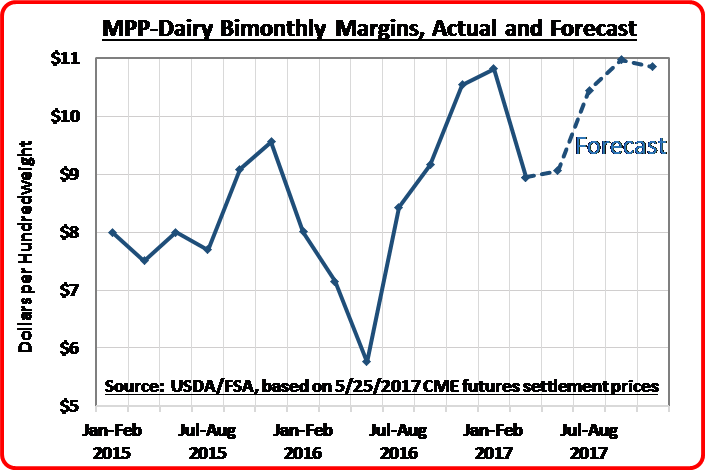
The monthly Margin Protection Program (MPP) feed cost for May was $8.09 per hundredweight based on corn and alfalfa hay prices reported last week by USDA’s National Agricultural Statistics Service (NASS), and soybean meal prices reported earlier by the department’s Agricultural Marketing Service (AMS). NASS also reported a 20-cent-per-hundredweight increase from April in the May U.S. average all-milk price, to $16.70 per hundredweight. Therefore, the monthly MPP margin for May was $8.61 per hundredweight.
The modest increase in the monthly all-milk price should be the beginning of a recovery that the current CME dairy futures markets collectively predict will top out at the end of this year at about the same price as when the year began, just under $19 per hundredweight. The milk price rise is being powered by increases in both Class III and Class IV prices, with most of that due to higher milkfat prices. Neither Class III nor Class IV skim prices are projected to rise much above their current levels through the end of the year, while domestic cheese stocks remain high and skim milk powder continues in oversupply globally.
The CME futures are currently projecting modest increases in corn prices into the harvest season and virtually flat prices for soybean meal through the end of the year. After falling for most of last year, the NASS alfalfa hay price has been increasing this year, from $128 per ton in January to $155 per ton in May. USDA’s current MPP margin forecast, based on the June 29 CME futures settlements, continues to project that the margin will remain well above $8 per hundredweight during 2017 with essentially no chance under current conditions that it will fall below that level.
USDA’s MPP margin forecasts are updated daily online. The Future for Dairy website offers a variety of educational resources to help farmers make better use of the program.
CWT Helps Member Co-ops Capture 4.1 Million Pounds of Export Sales
July 06, 2017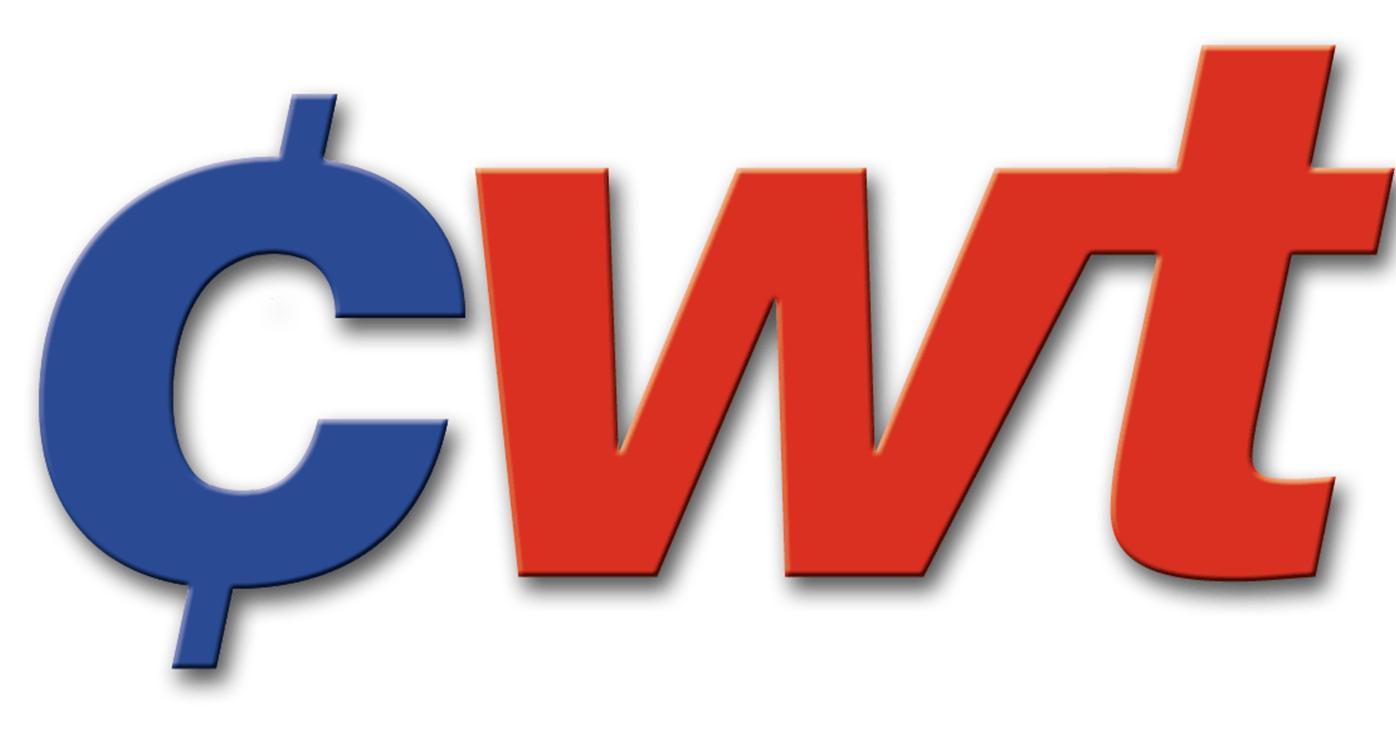 CWT member cooperatives secured 26 contracts to sell 4.1 million pounds of cheese to customers in Asia, Central America, the Middle East, North Africa and Oceania in June 2017. The product will be shipped from June through September 2017.
CWT member cooperatives secured 26 contracts to sell 4.1 million pounds of cheese to customers in Asia, Central America, the Middle East, North Africa and Oceania in June 2017. The product will be shipped from June through September 2017.
These transactions raise the total CWT-assisted product sales to 41.8 million pounds of cheese and 3 million pounds of butter. The sales are going to customers in 17 countries in five regions, and will move the equivalent of 453.9 million pounds of milk on a milkfat basis overseas through August 2017.
Helping CWT member cooperatives gain and maintain world market share through the Export Assistance program in the long term expands the demand for U.S. dairy products and the U.S. farm milk that produces them. This, in turn, positively affects all U.S. dairy farmers by strengthening and maintaining the value of dairy products that directly impact their milk price.
The amounts of dairy products and related milk volumes reflect current contracts for delivery, not completed export volumes. CWT will pay export assistance to the bidders only when export and delivery of the product is verified by the submission of the required documentation.
All cooperatives and dairy farmers are encouraged to add their support to this important program. Membership forms are available online.
Trump Administration Moves to Rescind Waters of the U.S. Rule
July 06, 2017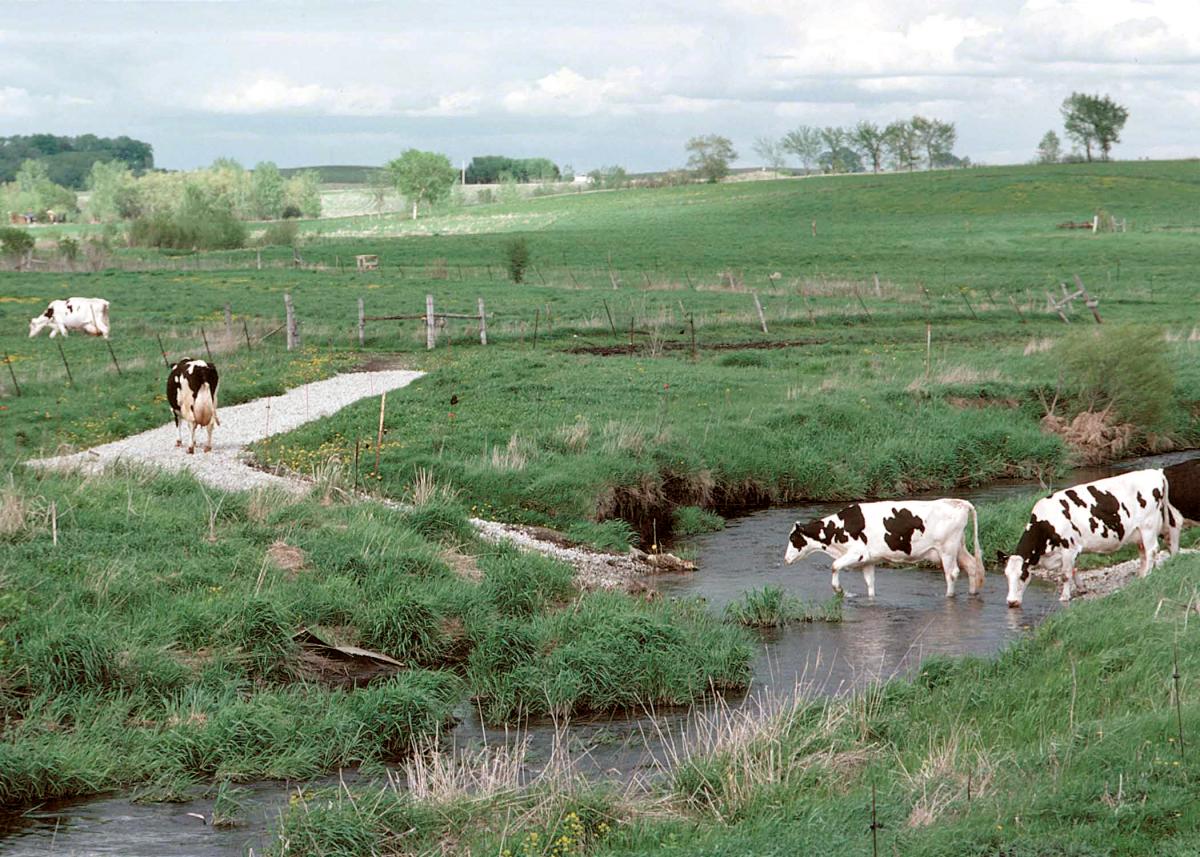
In a move supported by NMPF and other farm groups, the U.S. Environmental Protection Agency (EPA) and the U.S. Army Corps of Engineers announced they are taking initial steps to rescind the Waters of the U.S. (WOTUS) rule, which expanded federal authority to place certain waters under the Clean Water Act. The rule – suspended last year by a district court – frustrated dairy farmers and state attorneys general around the nation with its ambiguity and potential for serious regulatory overreach. NMPF, which repeatedly asked EPA to rewrite the rule, applauded EPA and the Trump Administration for recognizing the flaws in the existing regulation.
In May, NMPF told EPA to repeal the existing rule and implement a separate one that both closely adheres to the language in the Clean Water Act (CWA) and aligns with recent Supreme Court decisions that prompted EPA to issue the rule in the first place. NMPF will provide input to EPA on the action to rescind the current rule, as well as engage in the rulemaking process to redraft the previous language, once EPA initiates that action.
“NMPF is pleased by EPA’s action in tackling what most farmers in the nation viewed as a highly flawed rule,” said Jim Mulhern, president and CEO of NMPF. “We are confident that this time EPA and the Corps will get it right, thanks to input from NMPF and other agriculture organizations.”
The original WOTUS regulation, proposed in April 2014, established federal authority over “navigable” U.S. waters, but was later expanded to include upstream waters and streams, which farmers often use for drainage and irrigation. NMPF was not satisfied with the EPA’s first attempt to develop the regulation, and supported efforts to halt its implementation.
In total, 11 lawsuits were brought in federal district courts against EPA, and another 14 petitions were filed in U.S. Courts of Appeals around the nation. Earlier this year, the U.S. Supreme Court halted the rule indefinitely to determine which courts have jurisdiction over the matter.
NMPF Endorses New Biogas and Nutrient Recovery Tax Incentive Legislation
July 06, 2017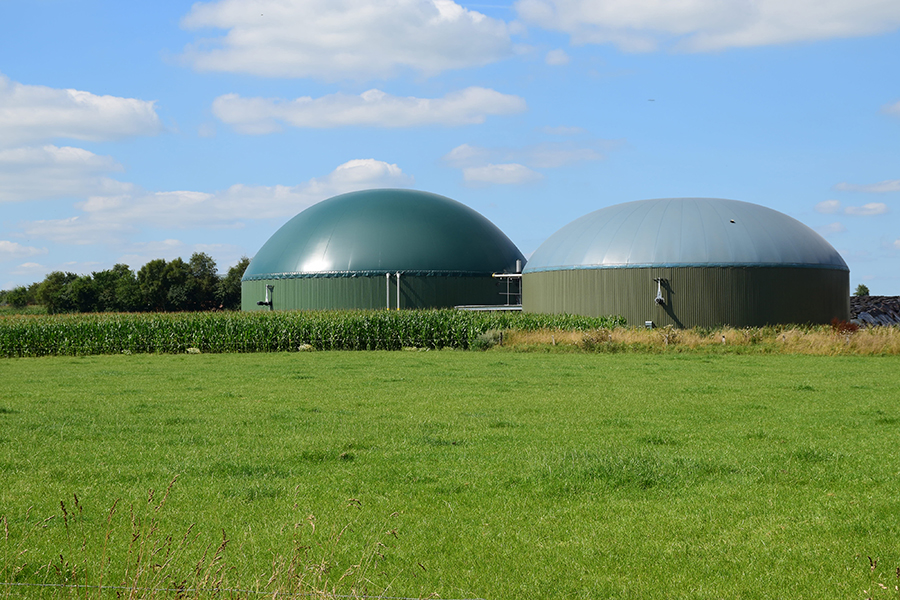 National Milk is advocating in support of new legislation, introduced in both the House and Senate, that would create tax incentives for nutrient recovery and biogas systems, and is working with the legislation’s sponsors to find opportunities to pass the measure as part of a broader tax reform bill.
National Milk is advocating in support of new legislation, introduced in both the House and Senate, that would create tax incentives for nutrient recovery and biogas systems, and is working with the legislation’s sponsors to find opportunities to pass the measure as part of a broader tax reform bill.
The legislation, known as the Agriculture Environmental Stewardship Act, will amend the tax code to make nutrient recovery technologies and biogas systems eligible for an investment tax credit to cover the upfront capital costs of installing the systems. The measure was sought by NMPF to help dairy farmers increase their investment in technologies that help recover and recycle nutrients from animal waste, in turn improving water quality in communities.
The new measure, H.R. 2853, was introduced in the House on June 8 by Reps. Ron Kind (D-WI) and Tom Reed (R-NY), and features a growing, bipartisan coalition of 24 representatives as co-sponsors. Sen. Sherrod Brown (D-OH) introduced an identical bill, S. 988, in the Senate in late April, where he was joined by co-sponsor Sen. Pat Roberts (R-KS), chair of the Senate Agriculture Committee.
“By creating incentives to make biogas and manure resource recovery technologies more affordable, the Agricultural Environmental Stewardship Act will encourage more widespread use of these technologies. This will benefit society by decreasing nutrient runoff in waterways, decreasing farm odors and improving water quality,” said Jim Mulhern, NMPF president and CEO.
The Agriculture Environmental Stewardship Act is also sponsored by the bipartisan co-chairs of the Congressional Dairy Farmer Caucus.
Michigan Milk Producers Association Earns Honorable Mention in Dairy Sustainability Awards
July 06, 2017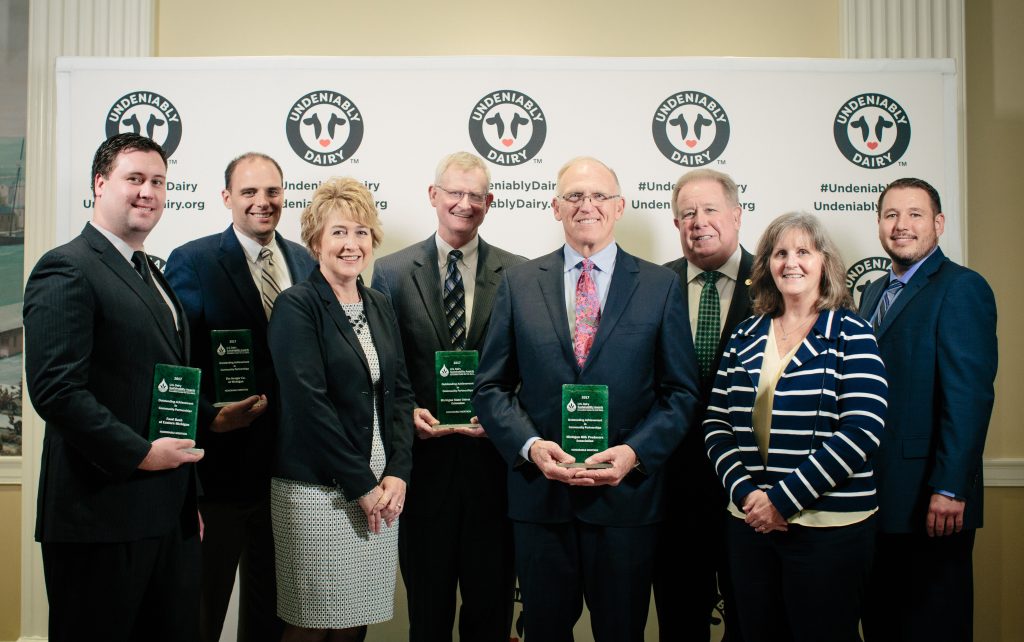 National Milk congratulated the Michigan Milk Producers Association (MMPA) after the member cooperative won honorable mention at the 2017 U.S. Dairy Sustainability Awards in late June for their work supporting food-insecure families after the Flint water crisis.
National Milk congratulated the Michigan Milk Producers Association (MMPA) after the member cooperative won honorable mention at the 2017 U.S. Dairy Sustainability Awards in late June for their work supporting food-insecure families after the Flint water crisis.
Together with the Food Bank of Eastern Michigan, The Kroger Co. of Michigan and Michigan State University (MSU), MMPA received an honorable mention for Outstanding Achievement in Community Partnerships. The group donated over 36,000 gallons of milk (589,824 servings) to the Flint community after it became susceptible to lead poisoning from contaminated water in 2016.
“When a crisis occurs in a community near you, farmers know just how important it is to step in and offer support, especially during a time when milk can make a difference,” said Ken Nobis, NMPF first vice-chair and MMPA president. “MMPA is appreciative of all those who sprang into action last year to aid Flint with nutrient-dense milk. We are humbled by this honor from the Innovation Center for U.S. Dairy and hope that other organizations may learn from our initiative and replicate in their own communities to support even more food-insecure families.”
The U.S. Sustainability Awards is a program hosted by the Innovation Center for U.S. Dairy that recognizes dairy farms, businesses and partnerships whose practices improve the well-being of people, animals and the planet. Award winners represent the U.S. dairy community’s voluntary efforts toward continuous improvement in sustainability. The 2017 recipients were announced June 28 in Chicago.
NMPF Comments Say Regulatory Process Should Permit Gene Editing
July 06, 2017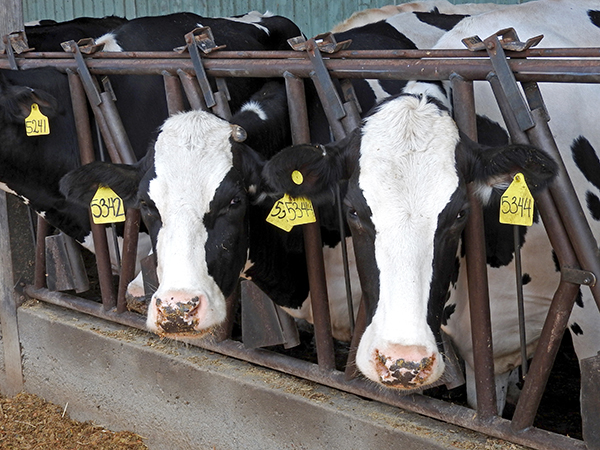 On June 19, NMPF submitted comments to the U.S. Food and Drug Administration (FDA) regarding the regulation of animals that result from gene-editing techniques. Gene-editing has potential for the U.S. dairy in helping to address animal welfare, antibiotics and sustainability issues.
On June 19, NMPF submitted comments to the U.S. Food and Drug Administration (FDA) regarding the regulation of animals that result from gene-editing techniques. Gene-editing has potential for the U.S. dairy in helping to address animal welfare, antibiotics and sustainability issues.
In its latest draft Guidance for Industry #187, “Regulation of Intentionally Altered Genomic DNA in Animals,” FDA proposes regulating animals that result from gene-editing techniques within a species in the same manner as animals resulting from transgenic techniques (adding genes from a different species) through the New Animal Drug Application (NADA) process.
NMPF commented that the NADA process is unnecessary for most gene-editing applications in livestock. Instead, NMPF suggested that FDA use the regulatory framework suggested by the recent 2017 National Academies of Sciences, Engineering and Medicine report, “Preparing for the Future Products of Biotechnology.” The report offers a clear pathway FDA can utilize to determine what approval should be required for gene-edited animals not intended to produce biopharmaceuticals or medical devices.
NMPF also proposed that FDA institute a notification process in which the developers of gene-edited animals inform the agency of the technical nature of the genetic edit so that it can categorize and take appropriate action. NMPF noted that FDA’s draft guidance may be appropriate for animals intended to produce biopharmaceuticals or medical devices.
NMPF Announces 2017 Scholarship Winners
July 06, 2017
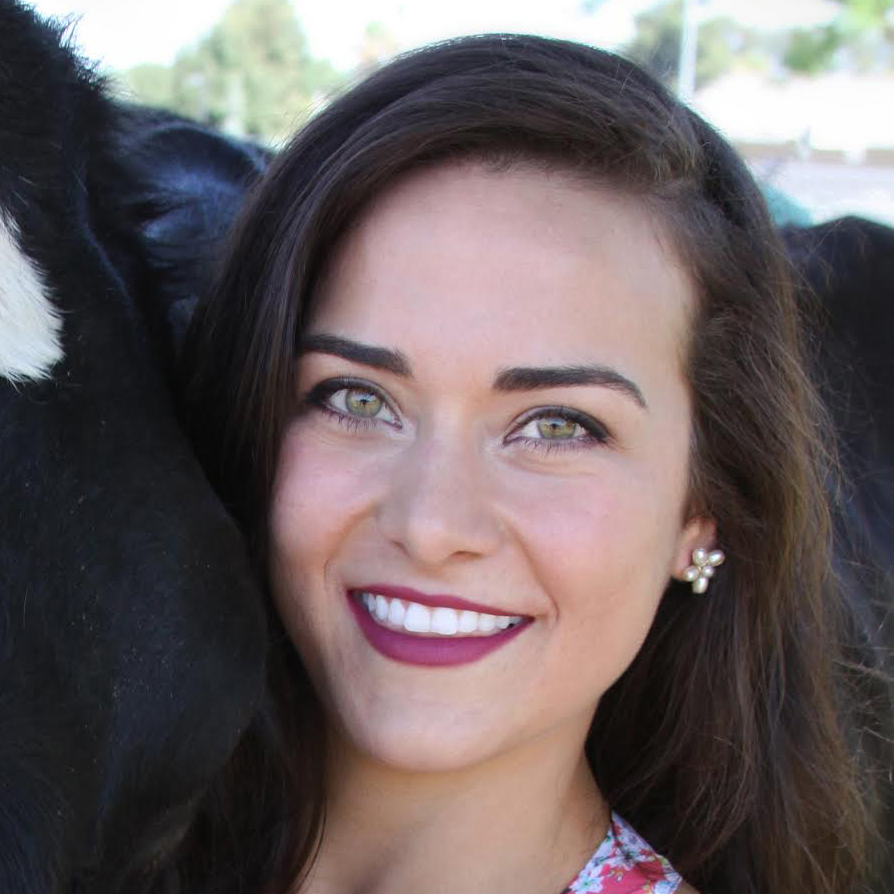 At NMPF’s June board meeting, the NMPF Scholarship Committee selected two graduate students to receive scholarships as part of the 2017 NMPF National Dairy Leadership Scholarship Program. These students are conducting research in areas that will benefit dairy cooperatives and producers.
At NMPF’s June board meeting, the NMPF Scholarship Committee selected two graduate students to receive scholarships as part of the 2017 NMPF National Dairy Leadership Scholarship Program. These students are conducting research in areas that will benefit dairy cooperatives and producers.
The 2017 Hintz Memorial Scholarship, given to the top scholarship candidate, was awarded to Sarah Adcock (above right), a Ph. D candidate in animal behavior at the University of California-Davis, who is studying the long-term welfare implications of hot-iron disbudding in dairy calves.
A scholarship was also awarded to Carlyn Peterson (above left), a Ph. D candidate in animal biology, also at the University of California-Davis, who is studying the use of a novel methane inhibitor to improve the environmental footprint of dairy cattle.
FARM Animal Care Events Prepare Program Evaluators for Version 3.0
July 06, 2017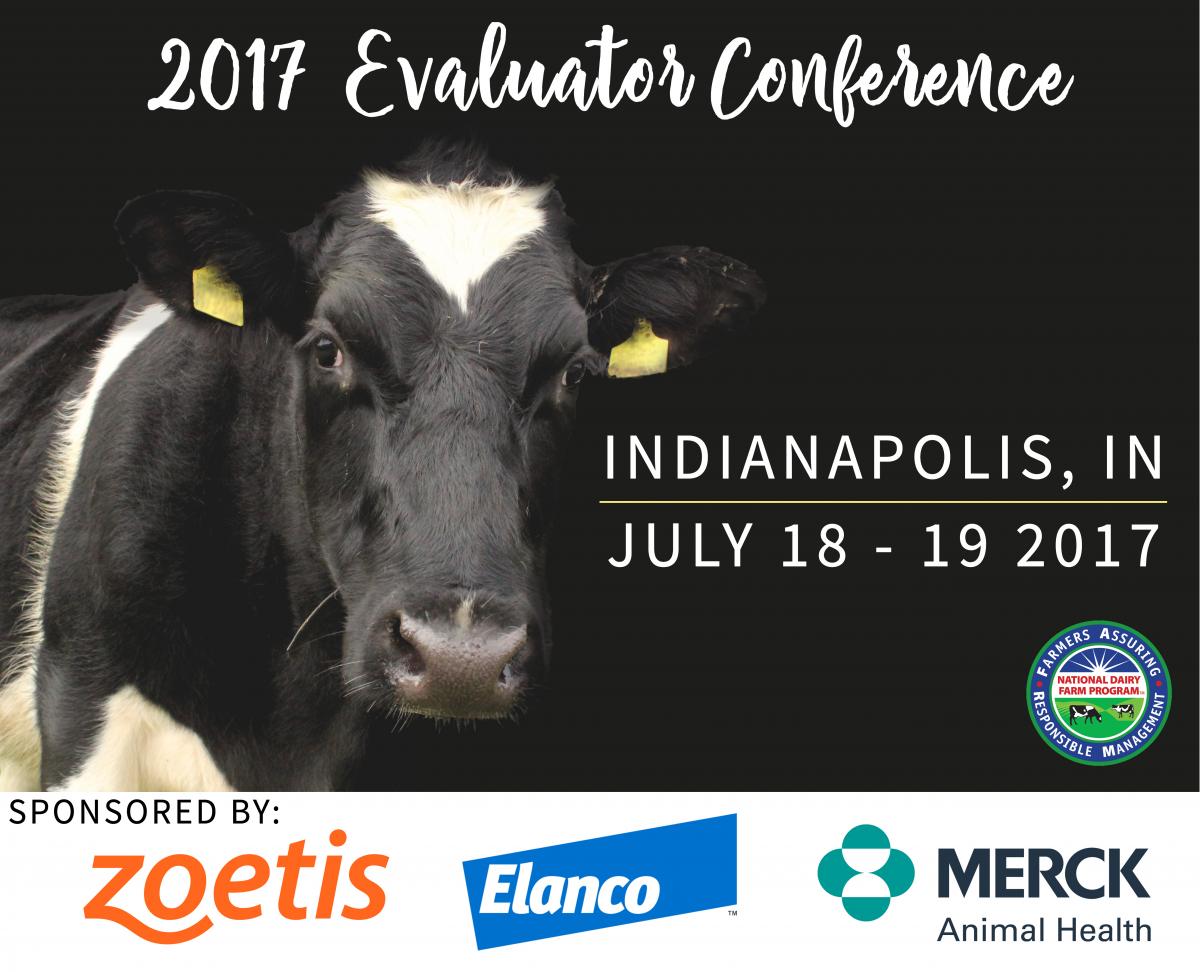 The second National Dairy FARM Program Evaluator Conference will be held in Indianapolis, Ind., on July 18-20, 2017. More than 400 trained FARM Animal Care evaluators will have the chance to network and discuss relevant topics in animal care, environmental stewardship and proper antibiotic use.
The second National Dairy FARM Program Evaluator Conference will be held in Indianapolis, Ind., on July 18-20, 2017. More than 400 trained FARM Animal Care evaluators will have the chance to network and discuss relevant topics in animal care, environmental stewardship and proper antibiotic use.
During the three-day conference, FARM Animal Care Evaluators will spend a day with staff from event sponsor Elanco, take part in presentations on topics like “The Economics of Animal Well-Being” and the importance of employee training, and have the option of visiting a 3,000-cow dairy operation.
On July 18, Elanco will host a professional development training session to teach evaluators about the company’s global business operation and commitment to feeding the world. On July 20, meeting attendees will visit Fair Oaks Farms, tour the dairy facilities and engage in a discussion on employee training.
Registration is $199 with the optional Fair Oaks tour an additional $50. For more information and to register for the conference, please visit the conference website.






